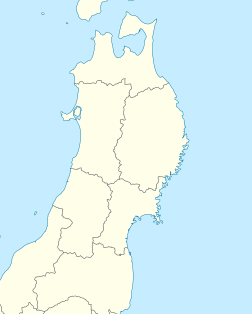The Zaō Mountains (蔵王連峰, Zaō Renpō), commonly called Mount Zaō, are a complex cluster of stratovolcanoes on the border between Yamagata Prefecture and Miyagi Prefecture in Japan. The central volcano of the group includes several lava domes and a tuff cone, Goshiki-dake, which contains a crater lake named "Okama". Also known as the "Five Color Pond" (五色沼, goshiki numa) because it changes color depending on the weather, it lies in a crater formed by a volcanic eruption in the 1720s. The lake is 360 metres (1,200 ft) in diameter and 60 m (200 ft) deep, and is one of the main tourist attractions in the area.
| Zaō Mountains | |
|---|---|
| 蔵王連峰 | |
 The Zaō Mountains as seen from the Shiroishi River, an Abukuma River tributary, at the cherry blossom season | |
| Highest point | |
| Elevation | 1,841 m (6,040 ft)[1][2] |
| Listing | |
| Coordinates | 38°08′38″N 140°26′24″E / 38.144°N 140.44°E[1] |
| Geography | |
 | |
| Country | Japan |
| Island | Honshu |
| Prefectures | |
| Geology | |
| Mountain type | Complex volcano |
| Last eruption | May 1940[1] |
One striking feature of Zaō's famous ski resorts are the "frost-covered trees" (樹氷, juhyō) that appear in mid-winter. Strong wind over the nearby lake fling water droplets which freeze against the trees and their branches, until near-horizontal icicles begin to form. Falling snow settles on the ice formations, and the end result is a grotesque figure of a tree. The effect of a full forest of such trees gives visitors a ghostly impression. Zaō is one of the 100 Famous Japanese Mountains.
Rotaria rotatoria[3] and Pinnularia spp.[4] are found in the acidic Okama Lake.[5]
-
Relief Map
-
Okama Crater
-
Okama Crater
-
Snow monsters
-
View from Mount Zao in winter
-
A 3D rendering
See also
editReferences
edit- ^ a b c "Zaozan [Zaosan]". Global Volcanism Program. Smithsonian Institution. Retrieved 2023-04-28.
- ^ "Topographic map of Zao". opentopomap.org. Retrieved 2023-04-28.
- ^ Deneke, Rainer (2000). "Review of rotifers and crustaceans in highly acidic environments of pH values ≤ 3". Hydrobiologia. 433 (1–3): 167–172. doi:10.1023/a:1004047510602. S2CID 25056334.
- ^ Negoro, K (1940). "A Pinnularia from Okama, an acidotrophic crater lake of volcano Zao". Jpn. J. Limnol. 9 (4): 176–179. doi:10.3739/rikusui.9.176.
- ^ Anzai, T (1938). "Limnological observation of Okama, a crater lake of Volcano Zaō". Jpn. J. Limnol. 8 (3–4): 264–272. doi:10.3739/rikusui.8.3-4_264.
External links
edit- "English Travel information on Mt. Zao". 21 April 2022.(in English)
- Zaozan - Japan Meteorological Agency (in Japanese)
- "Zaozan: National catalogue of the active volcanoes in Japan" (PDF). - Japan Meteorological Agency
- "Zao" (in Japanese). Geological Survey of Japan.







